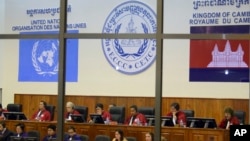A prominent human rights group is criticizing Cambodia for failing to pay local staff at the Khmer Rouge war crimes tribunal.
About 200 Cambodian workers at the United Nations-backed court went on strike Monday, after not being paid for months.
Human Rights Watch said Thursday the government is intentionally withholding funds to obstruct the trials of former Khmer Rouge leaders.
The Cambodian side of the court, which lacks nearly $3 million in funding, has dealt with allegations of mismanagement and corruption since its 2006 inception.
Japan, one of the court's top donors, has suggested some of its funding, which was intended for the international side of the tribunal, could be used to pay the local workers.
But Human Rights Watch said international donors should withhold future contributions until the Cambodian government pays its share of the costs of the tribunal.
It suggested that Prime Minister Hun Sen's government, which is led by some ex-Khmer Rouge members, is "pretending to be too poor to provide accountability to the millions of Khmer Rouge victims."
The United Nations, which funds of its own staff at the tribunal, has said the Cambodian government is obligated to pay its workers.
Cambodia has not commented on the latest allegations.
The tribunal was set up to prosecute the top leaders of the Khmer Rouge regime, which is blamed for the deaths of nearly two million Cambodians during its bloody, four-year rule in the late 1970s.
The court has handed down only one conviction, and the advanced age of the remaining defendants has cast doubt on prospects of finishing its job while they are still alive, or able to participate in their trials for war crimes, genocide and crimes against humanity.
Nuon Chea and Khieu Samphan, both in their 80s, are the only senior Khmer Rouge leaders alive and considered fit to stand trial. They deny the charges. The group's leader, Pol Pot, died in 1998, and co-founder Ieng Sary died earlier this year.
Former Khmer Rouge prison chief Kaing Guek Eav, better known as "Duch," was sentenced last year to life in prison for his role in killing more than 14,000 people while running the Tuol Sleng torture and execution center in Phnom Penh.
About 200 Cambodian workers at the United Nations-backed court went on strike Monday, after not being paid for months.
Human Rights Watch said Thursday the government is intentionally withholding funds to obstruct the trials of former Khmer Rouge leaders.
The Cambodian side of the court, which lacks nearly $3 million in funding, has dealt with allegations of mismanagement and corruption since its 2006 inception.
Japan, one of the court's top donors, has suggested some of its funding, which was intended for the international side of the tribunal, could be used to pay the local workers.
But Human Rights Watch said international donors should withhold future contributions until the Cambodian government pays its share of the costs of the tribunal.
It suggested that Prime Minister Hun Sen's government, which is led by some ex-Khmer Rouge members, is "pretending to be too poor to provide accountability to the millions of Khmer Rouge victims."
The United Nations, which funds of its own staff at the tribunal, has said the Cambodian government is obligated to pay its workers.
Cambodia has not commented on the latest allegations.
The tribunal was set up to prosecute the top leaders of the Khmer Rouge regime, which is blamed for the deaths of nearly two million Cambodians during its bloody, four-year rule in the late 1970s.
The court has handed down only one conviction, and the advanced age of the remaining defendants has cast doubt on prospects of finishing its job while they are still alive, or able to participate in their trials for war crimes, genocide and crimes against humanity.
Nuon Chea and Khieu Samphan, both in their 80s, are the only senior Khmer Rouge leaders alive and considered fit to stand trial. They deny the charges. The group's leader, Pol Pot, died in 1998, and co-founder Ieng Sary died earlier this year.
Former Khmer Rouge prison chief Kaing Guek Eav, better known as "Duch," was sentenced last year to life in prison for his role in killing more than 14,000 people while running the Tuol Sleng torture and execution center in Phnom Penh.










